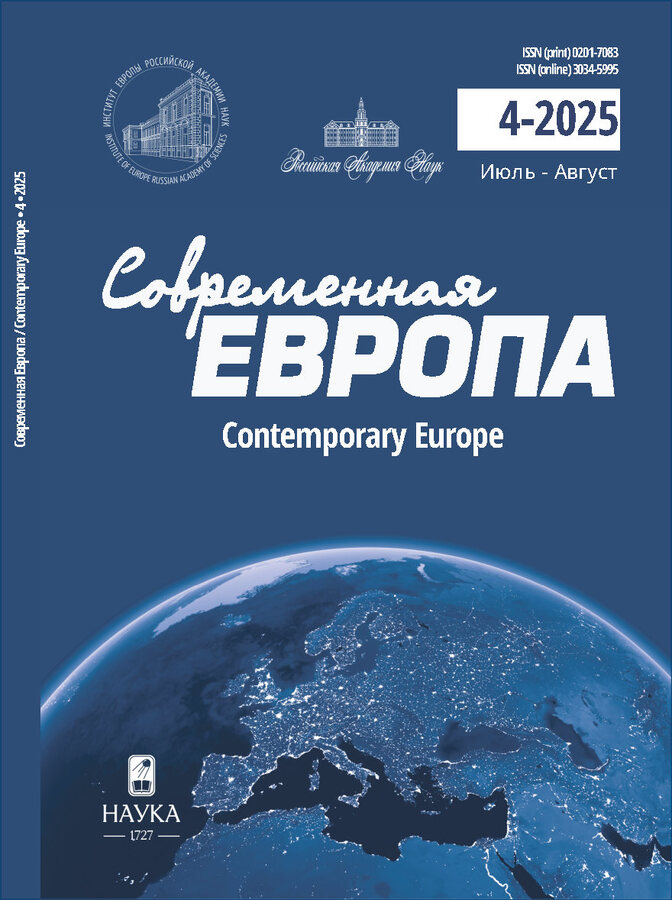Austria: Unstable Power in the First Quarter of 21st Century
- Autores: Shveitser V.Y.1
-
Afiliações:
- Institute of Europe Russian Academy of Sciences
- Edição: Nº 4 (132) (2025)
- Páginas: 112-125
- Seção: EUROPEAN PROCESS: COUNTRIES AND REGIONS
- URL: https://rjraap.com/0201-7083/article/view/691007
- DOI: https://doi.org/10.31857/S0201708325040102
- ID: 691007
Citar
Texto integral
Resumo
The articled explores the process of government formation in Austria in the first quarter of this century with the Austrian People’s Party (ÖVP) and the Social Democrats (SPÖ) as the main actors. The Greens and the Liberals from New Austria (NEOS) also played a certain role. The article provides an assessment of the coalition cooperation between the ÖVP and the FPÖ in 2000–2006, the SPÖ and the FPÖ in 2007–2016, and the FPÖ and the Greens in 2019–2024. The features of the current FPÖ-SPÖ-Liberals coalition (since March of 2025) are highlighted. The main factors that determined the mentioned temporarily cooperation and following collapse of their coalitions are demonstrated. The author argues that the instability of governments is related to the unwillingness of political elites to solve both intra-Austrian and pan-European problems. Among the latter: the scale of immigration influx, issues of energy security in the Old World, and financial and economic features of the early XXI century are particularly important.
Palavras-chave
Sobre autores
V. Shveitser
Institute of Europe Russian Academy of Sciences
Email: partsisit@list.ru
Doctor of Sciences (History), Department of Country Studies 11-3, Mokhovaya street, Moscow, Russia, 125009
Bibliografia
- Бадаева А.С. (2018) Австрийская партия Свободы: между правым популизмом, австрийским патриотизмом и немецким национализмом. Контуры глобальной трансформации. № 3. С. 53–68.
- Грибовский В.С. (2020) Австрия: обновление коалиционного ландшафта. Коалиционные правительства в современной Европе: шансы и риски. Доклады ИЕ РАН № 374.Под ред. В.Я. Швейцер, ИЕ РАН, Москва. С. 99–102.
- Новикова И.Н., Смирнова А.Н. (2023) Внешняя политика Австрии при Себастьяне Курце (2013–2021 годы): страна диалога. Вестник Московского государственного лингвистического университета. Общественные науки. Вып. 3(852). С. 71–78. doi: 10.52070/2500-347X_2023_3_852_71
- Свечникова С.В., Ефремов А.В. (2020) Австрийская партия Свободы в XXI в. Идеология и практика. Ученые записки ОГУ. № 3. С. 16–21.
- Ульрам П.А. (2007) Австрийская партия Свободы. Консервативные и либеральные партии западноевропейских стран. ИНИОН РАН. Москва. С. 170–179.
- Швейцер В.Я. (2018) Австрийская партия Свободы: путь во власть. Современная Европа. № 2. С. 105–114.
- Швейцер В.Я. (2021) Австрийские политические скандалы: «дело Курца». Научно-аналитический вестник ИЕ РАН. № 6. С. 139–146.
- Швейцер В.Я. (2022) Президенты Австрии: роль в национальной политике. Современная Европа. № 4. С. 185–199.
- Швейцер В.Я. (2019) Европейские выборы и кризис австрийской политической модели. Выборы в Европейский парламент. Национальные ответы на дилеммы европейской интеграции. Под ред. Ю.Д. Квашнина, А.К. Кудрявцева, Н.С. Плевако, В.Я. Швейцера. ИМЭМО РАН, ИЕ РАН. Москва. С. 139–141.
- Шмелев Д.В., Белячков Е.Е. (2024) Партийно-политический ландшафт Австрии после выборов в национальный совет 2024 г. Научно-аналитический вестник ИЕ РАН. № 6. С. 124–138. doi: 10.15211/vestnikieran62024124138
- Al-Serori L., Das Gupta O. (2017) Die Akte Strache. Suddeutsche Zeitung. 10.10.2017.
- Baumgartner M. (2019) “Joschi, mach das jetzt klar“. Der Spiegel. No. 21. P. 78–83.
- Ferrero-Waldner B. (2017) Benita. Wo ein Wille da ein Weg. Wien-Koln-Weimar. Bohlau Verlag. 467 p.
- Handbuch freiheitlicher Politik. (2013) Wien, FPÖßBildungsinstitut.
- Kaufmann S. (2016) Austria’s Election Is a Warning to the West. The New York Times.
- Ottomezer I. (2009) Jörg Haider. Mathenbildung und Erbschaft. Klagenfurt. Drava Verlag.
- Pelinka A. (2002) Die FPÖ im internationalen Vergleich. Zwischen Rechtpopulismus, Deutschnationalismus und Österreich-Patriotismus. Universität Innsbruck.
- Regierungsprogram von ÖVP und FPÖ. Wien. (2018).
Arquivos suplementares










